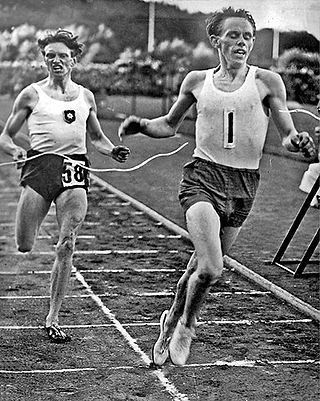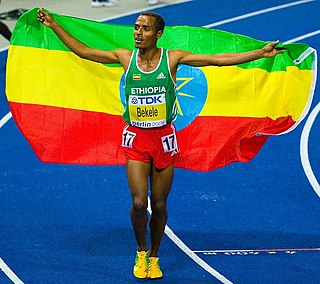The world record in the mile run is the fastest time set by a runner in the middle-distance track and field event. World Athletics is the official body which oversees the records. Hicham El Guerrouj is the current men's record holder with his time of 3:43.13, while Faith Kipyegon has the women's record of 4:07:64. Since 1976, the mile has been the only non-metric distance recognized by the IAAF for record purposes. However, in international competitions such as the Olympics the term "mile" almost always refers to a distance of 1,500 meters, which is 109.344 meters shorter than an Imperial mile, even though four "full" laps of a 400 meter track is equal to 1,600 meters.

The first world record in the 100 metres sprint for women was recognised by the Fédération Sportive Féminine Internationale (FSFI) in 1922. The FSFI was absorbed by the International Association of Athletics Federations (IAAF) in 1936. The current record is 10.49 seconds set by Florence Griffith-Joyner in 1988.
A metric mile is a colloquial term used in some countries for the 1500 meters, the premier middle distance running event in international track and field. The term 'metric mile' was applied to this distance because it approximates one statute mile (1609.344 m). The term is most commonly used in track running, speed skating and swimming.

The 1500 metres or 1,500-metre run is the foremost middle distance track event in athletics. The distance has been contested at the Summer Olympics since 1896 and the World Championships in Athletics since 1983. It is equivalent to 1.5 kilometers or approximately 15⁄16 miles. The event is closely associated with its slightly longer cousin, the mile race, from which it derives its nickname "the metric mile".

Jules Ladoumègue was a French middle-distance runner. He became a running star as the sport enjoyed a huge resurgence at the start of the Great Depression, fueled in large part by newsreel coverage. His career was abruptly cut short when he was banned for life from track for payments he received for several races.
Norman Stephen Taber was an American middle distance runner. He was the first amateur runner to surpass Walter George's professional record in the mile, set nearly 30 years previously. He also won a bronze medal over 1500 m and a gold medal in the team 3000 m at the Olympic Games in Stockholm 1912.

The 3000 metres or 3000-metre run is a track running event, also commonly known as the "3K" or "3K run", where 7.5 laps are run around an outdoor 400 m track, or 15 laps around a 200 m indoor track.

The mile run is a middle-distance foot race.
Thomas Conneff was an amateur Irish runner who held the amateur record for the fastest mile from 1895 to 1911.
William Lang was a professional British runner, who set world records in numerous running events in the 1860s, including a mile record which stood for 16 years.
John Paul Jones was an American track athlete who set several world records in the mile, including the first mile record to be ratified by the International Association of Athletics Federations in 1913.
The following table shows the world record progression in the men's and women's 800 metres, officially ratified by the IAAF.

The following table shows the world record progression in the men's 200 metres, as ratified by the IAAF. The current record of 19.19 seconds was set by Usain Bolt at the 2009 World Championships in Athletics.
The first world record in the 400 m for men (athletics) was recognized by the International Amateur Athletics Federation, now known as World Athletics, in 1912. The IAAF ratified Charles Reidpath's 48.2 performance set at that year's Stockholm Olympics as a world record, but it also recognized the superior mark over 440 yards run by Maxie Long in 1900 as a world record.
The first World Record in the 200 m for women (athletics) was recognised by the Fédération Sportive Féminine Internationale (FSFI) in 1922. The FSFI was absorbed by the International Association of Athletics Federations in 1936. However, the IAAF did not maintain a record category for 200 m (bend) as opposed to 200 m (straight) until after 1951. The IAAF eliminated the 200 m (straight) record after 1976. "y" denotes times set at 220 yards which were ratified as world records.
The first world record in the men's 400 metres hurdles was recognised by the International Association of Athletics Federations in 1912. That inaugural record was the performance by Charles Bacon at the 1908 Olympics.
James Nuttall was a professional British runner, who broke several records, and is regarded as "one of the best sprinters and quarter milers in England in the 1860s". During his thirteen-year career, Nuttall ran 440 yards in 51.5 seconds, and ran the half-mile in a world’s best time of 1:55.5.
The official world records in the 5000 metres are held by Joshua Cheptegei with 12:35.36 for men and Gudaf Tsegay with 14:00.21 for women.

The official world records in the 10,000 metres are held by Ugandan Joshua Cheptegei with 26:11.00 minutes for men and Ethiopian Letesenbet Gidey with 29:01.03 for women.
The following table is an overview of national records in the 1500 metres.







